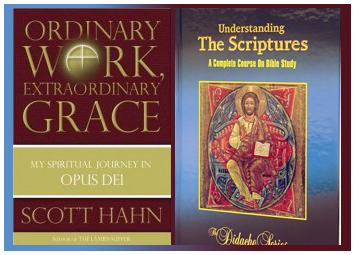
Last night I had the privilege of attending a dinner celebrating 50 years of Opus Dei in Saint Louis. My father and I, together with some of his friends, had the unmerited good fortune to sit with four priests ranging in age from 26 to 75. I sat next to the 75 year-old priest and since he told me his hearing wasn't so good, I felt quite content to let him share his wisdom and experience with me.
The draw for me to this event was the speakers it had lined up: Kimberly and Scott Hahn. Kimberly talked about the family as the domestic Church. She talked from her experience of being a married Protestant with a husband who became Catholic as well as when she had come into the Church herself. Her talk was geared to the "ordinary" which is precisely the place where God's plan is revealed. Scott Hahn in his talk later quoted Josemaria Escriva (the founder of Opus Dei) in saying those who wanted to divorce ordinary life from the holy life were "mystical wishful-thinkers". Family life for the lay Christian is the ordinary means to extraordinary grace.
Scott Hahn's talk comes mainly from his book Ordinary Work, Extraordinary Grace. As a cooperator in Opus Dei even before his Easter reception into the Church, Dr Hahn certainly has a large appreciation for this organization. He described the paradox of Opus Dei having a priestly soul with a lay mentality. "Isn't that like a married bachelor?" he asked. Then he ran across a phrase in Scripture that gave him pause. Christians were to be a "priestly kindgom". Priests rule over liturgy and holiness where Kings rule over the secular order of justice and goodness. The paradox then seemed more profound.
Scott also revealed the "secret" of Opus Dei. "We all know it's that albino monk. It's only that Opus Dei doesn't have monks". He describes the spiritual foundation and "secret" of Opus Dei as "Divine filiation" in the words of Josemaria. This means divine sonship; a real family bond. He says that in Judaism man's sonship with God is metaphorical, in Islam it is blasphemy, but in Catholicism it is actual, ontological, metaphysical. He also said that it was metaphorical in most of the Protestant tradition, where divine adoption is legal and metaphorical.
It was a wonderful experience all around. The priests, quite eager to see if I would like to try on one of those fancy white collars, were very holy souls with more than their reasonable load to bear. The speakers were excellent (though I am prejudiced having been the student of both). And I also got a new book (a text book), Understanding the Scriptures, which happens to be a complete course in Bible Study written by my favorite Bible scholar, Dr Scott Hahn. In his New Testament class we used an evangelical textbook, which while being quite good, was insufficient for reading the Bible in the stream of the Christian Tradition.
Opus Dei also looks like something to be more closely examined by someone like me. It seems to speak to the exact spirituality that I have grown to discern within myself. Definitely something to look at in the coming months.
From: http://toonemorestep.blogspot.com/2006/10/opus-dei_14.html
No comments:
Post a Comment